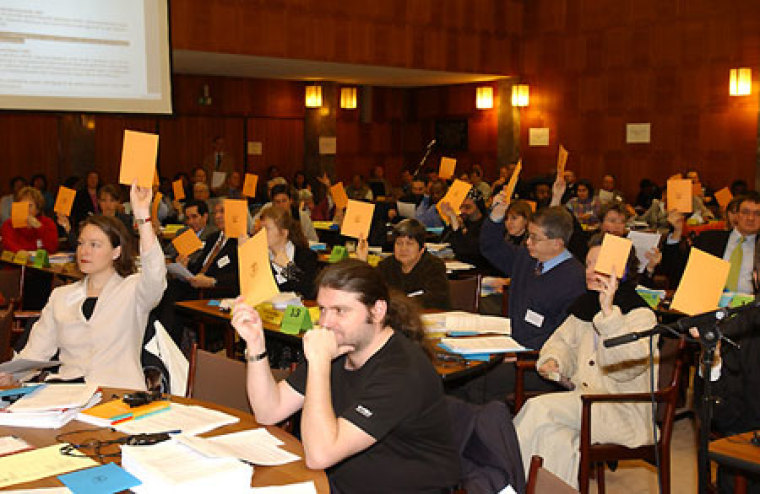
The meeting of the Central Committee of the World Council of Churches (WCC) ended yesterday. The Council is now ready to stride towards the ninth assembly with renewed constitutional rules and institutional structure. The reform is the new consensus model for decision-making which has been widely appreciated by churches.
The new model allows the presentation of a wide range of opinions from different groups, and table discussions will follow after the presentations. Each central committee member received an orange card to be displayed if he or she was feeling "warmth" toward a concept or a speaker's idea, and a blue card to display if they were feeling "coolness" toward a concept or idea. Holding blue and orange up together suggests that it is time to move on.
The Council believes that the model is particularly efficient in dealing with controversial issues such as human sexuality. In these types of special scenarios where a consensus cannot be reached, and participants feel that the urgency of business requires moving forward; a business item can shift to a vote if 85 percent of them approve.
However, some other items such as elections, finances, and constitutional changes, will still always be carried out by vote rather than the consensus model.
In fact, the idea of the consensus model was suggested by the former president of the Uniting Church in Australia, Rev. Dr D'Arcy Wood. The Church has encountered many problems in making decisions since the merger of three denominations took place in 1977. Later, by endorsing the consensus model, the Church has been able to make decisions that are reflective of the diversity of the church as much as possible. The Consensus model has proved to be a better way of reflecting the nature of the church.
According to Dr Wood, the model also required a significant education process, both for the moderator (who carries a large amount of responsibility) and for all those participating in the meeting.
During the WCC central committee meeting this time, committee members were also repeatedly coached not to jump up and immediately rebut another speaker's opinion or to simply say again what another speaker had already said. The goal of the consensus is to build on the wisdom and insight each speaker offers to work towards a common mind - "seeking the mind of Christ".
In addition, they were told that the cards were not to be waved about, but rather subtly held at chest level to help the moderator discern the mood of the group.
The reform of the decision-making method arose by the Special Commission on Orthodox Participation, which examined ways of making sure that the Orthodox voice would be heard in WCC decisions. It was commented that the parliamentary system used before was often unable to reflect the minority voice.
General Secretary of the WCC Rev Dr Samuel Kobia said, "Some member churches have already found in their own internal life and witness that making decisions by consensus is a better way of reflecting the nature of the church as described in the New Testament."
"Some other member churches argue very strongly that the WCC can bear witness today within a world which is marked by conflicts, tensions and war not only by its programmes, but also by the way it does business."
Eden Grace, a central committee member from the Religious Society of Friends said, "Listen to each and respond to each other in a spirit of open listening. We don't just accumulate more messages in favour than against. We build a common mind. It's a much more dialogical approach than we've had in the past."